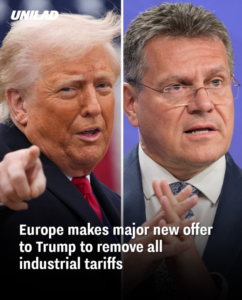Europe Makes Major New Offer to Trump to Remove All Industrial Tariffs
In a bold and potentially game-changing move, the European Union has extended a significant offer to former U.S. President Donald Trump: eliminate all industrial tariffs between the two economic powerhouses. The offer, reportedly aimed at defusing longstanding trade tensions, is Europe’s clearest signal yet that it’s willing to make sweeping compromises to reset its relationship with Trump, who remains a dominant force in American politics and a likely contender for the presidency once again.
At the heart of the deal is the EU’s proposal to remove all tariffs on non-agricultural goods—a move that could open up billions in transatlantic trade and give a much-needed boost to industries on both sides. The offer, according to insiders familiar with the talks, is not just symbolic. It’s designed to appeal directly to Trump’s interest in deal-making and his frequent criticisms of what he has called “unfair” trade practices by Europe.
The timing is notable. As the world watches the shifting tides of American politics and anticipates a potential Trump return to the White House, Brussels appears to be positioning itself strategically. EU officials are reportedly trying to avoid a repeat of the trade clashes that defined Trump’s first term, during which he slapped tariffs on European steel and aluminum, prompting retaliatory measures from Europe. This new offer could signal a proactive attempt to establish friendlier economic ties before tensions reignite.
From Europe’s perspective, this is not a concession of weakness—it’s a pragmatic play. Eliminating industrial tariffs could stimulate manufacturing, benefit exporters, and lower costs for consumers and businesses alike. It also aligns with Europe’s broader goals of strengthening transatlantic supply chains in an increasingly unpredictable global economy. For Trump, should he be re-elected, such a deal would offer an opportunity to declare a major “win” on trade without resorting to protectionist measures that could harm U.S. manufacturers or spark new trade wars.
However, the deal is not without its complications. Trump’s past rhetoric has made clear that he’s skeptical of multilateral deals and prefers bilateral arrangements that he can personally shape. There’s also the looming question of agriculture—a sensitive topic for both U.S. and European farmers. The current proposal excludes agricultural products, a sticking point that could frustrate American negotiators who want greater access to European food markets.
Still, the offer marks a notable shift in tone from the EU, which has traditionally been slower to make sweeping trade overtures. It shows a Europe that’s learning to speak Trump’s language—deals, wins, and economic dominance—while still protecting its own interests.
Whether Trump accepts the deal remains to be seen. But one thing is certain: Europe is playing a long game, and it’s ready to negotiate hard if it means avoiding a new round of tariff-fueled chaos. The ball, as they say, is now in Trump’s court.
